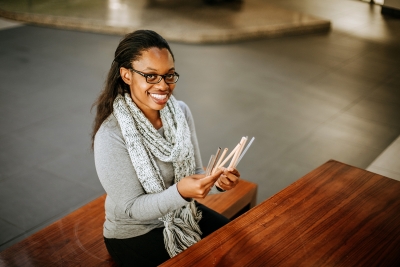Excellence Award for research into plastic marine pollution

An engineering approach to the issue of plastic marine pollution has received the 2019 Excellence in Academia PETCO Award.

Takunda Chitaka, a PhD student in the Department of Chemical Engineering at UCT, is the first recipient of this award which recognises the importance of having peer-reviewed research underpinning strategic interventions into the broad areas of recycling, waste minimisation and sustainability.
Since 2016, Chitaka has been gaining an understanding of what the marine plastic waste situation is based on empirical evidence, which was something she found lacking in the discussion about potential solutions. To bring a more grounded approach to the search for solutions, she used a beach accumulation survey to estimate the litter flows into the marine environment.
“On day one, you clean the beach of all the litter. The next day you return and pick up all the litter again, which gives you 24 hours of litter that has washed up onto the beach. Academically this is generally acknowledged to be a good proxy of what is flowing into the ocean,” Chitaka explained.
One of the most interesting observations Chitaka made was how different each beach is. She looked at five beaches and found one beach had around 36 items per 100 meter per day, where the other beach had 3000 items. Another important thing she noticed was how the composition of the litter has changed. “Ten years ago, everyone was concerned about plastic bags,” she said. “In my litter collection, I found very few plastic bags across all the beaches. Lots of polystyrene packaging, snack packets and straws were found. A mitigation approach focused on items associated with food consumed on the go may address a third to a half of marine litter sources in Cape Town.”
Chktaka’s supervisor, Professor Harro von Blottnitz, said, “This type of work brings clarity to a hyped-up public discussion and can help stakeholders to develop evidence-based solutions. It is great that a scheme which manages to recycle 65% of all PET bottles in South Africa has decided to make an award for supporting academic research.”
Chitaka added, “My hope for my research is that it helps to inform the way forward for the plastics economy in South Africa.”